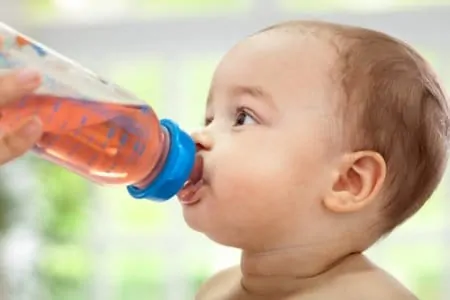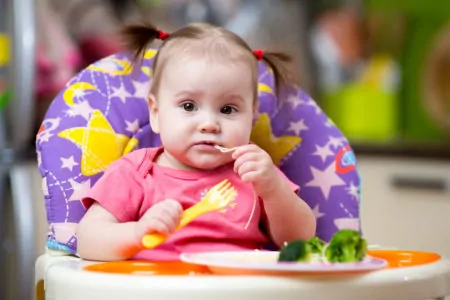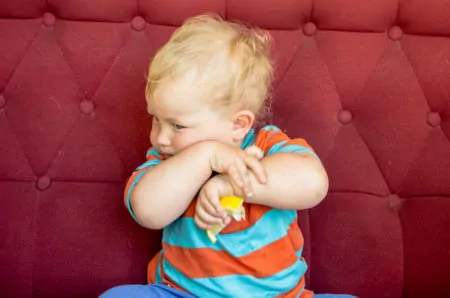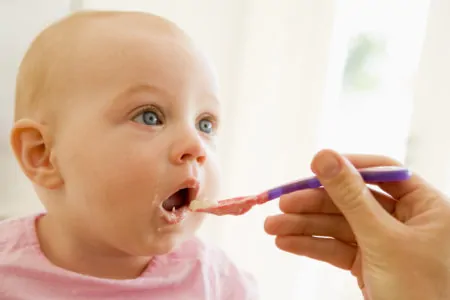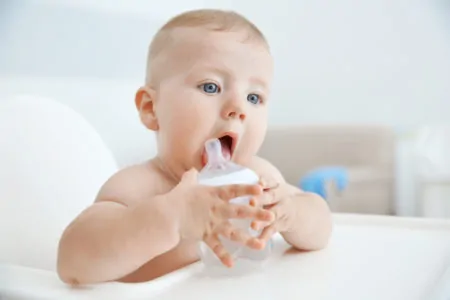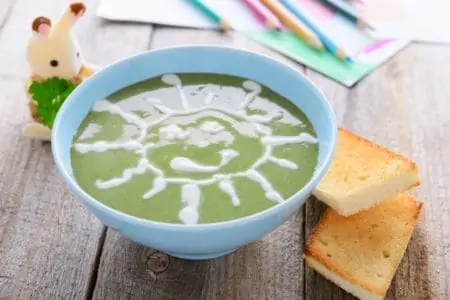Growing up, my mom was (and still is) an avid tea enthusiast. in her eyes, there is nothing a warm brew of chamomile can’t fix. Now that I’m a mom who also enjoys tea and understands the benefits, I’ve found myself wondering if I can share a cup with my baby.
New parents often receive strict advice to avoid anything other than breast milk and formula during the newborn stage (1). However, many herbs found in teas, like dill and peppermint, are used synthetically for upset tummies in infants.
We thoroughly researched the safety of giving tea to babies and found some surprising answers. Before arranging a tea party for your newest addition, check out what we learned about safety, age limits, and brewing methods.
Key Takeaways
- Babies can have herbal tea once they are six months or older, but strictly in moderation.
- Chamomile tea is popular for soothing digestion, reducing inflammation, and helping with mild colic symptoms.
- Always avoid caffeinated teas, sweetened teas, linden flower, and star anise due to serious health risks.
- Consult your pediatrician before introducing herbal remedies to ensure they don’t interfere with nutrient absorption.
Can I Give My Baby Tea?
You can give your baby tea if they are six months or older, but keep it to small amounts. Before six months, your baby’s digestive system is not ready for anything other than breast milk or formula.
Before six months old, it is only safe to feed your infant breast milk or formula. Other fluids are not balanced in their electrolyte content, and your baby’s immature kidneys cannot handle them. It is also important not to replace breastfeeding or formula feeding with tea. This can result in poor weight gain and lower-than-optimal iron intake (2).
Editor's Note:
Dr. Leah Alexander, MD, FAAPHerbal teas often help adults relax, energize, or improve their mood after a hard day. With babies, the goal is usually to soothe a tummy or help them settle down.
However, you should not offer just any type of tea off the grocery shelf. The best choices are single-ingredient herbal options, like chamomile, which aids sleep and digestion (3).
Chamomile contains soothing properties that can relieve gassy or fussy babies.
Other herbal teas considered safe in moderation include (4):
- Licorice: Often used to help soothe coughs or sore throats.
- Peppermint: Known for helping with bloating and general tummy troubles.
- Ginger: A classic remedy for nausea and digestion issues.
- Fennel: Frequently used to help with gas and colic symptoms.
Research into how specific teas affect babies is still limited. While some herbs are generally labeled as safe, you should always keep quantities small (a few teaspoons). We strongly suggest you consult your pediatrician first to rule out any potential allergies or interactions (5).
Milk Supply
Chamomile Tea for Babies
Chamomile is known as a carminative herb. It contains properties that prevent gas formation and promote gas expulsion. It works by relaxing the small bowel muscles, which makes it easier for the baby to pass gas and bowel movements.
This herb also acts as a mild sedative. Many adults take it before bed to wind down. It even gets a famous mention in the Peter Rabbit story for this exact reason.
Chamomile can soothe your baby, but manage your expectations. Giving them a cup of chamomile won’t magically make them sleep through the night, but it may help them relax.
Chamomile is also anti-inflammatory (7). People have used it for thousands of years, and it remains a staple in natural medicine cabinets today.
Chamomile and Other Herbal Teas for Colic
Chamomile alleviates many ailments, but its effectiveness for colic is a bit complicated.
Baby colic is a condition where a baby cries excessively during the first 12 weeks of life. Experts are unsure of the exact cause but suggest it relates to gas, overfeeding, hunger, or intolerance to certain proteins (8).
Some specialists have experimented with giving babies chamomile for colic. In one study, doctors administered a blend of German chamomile, fennel, vervain, balm mint, and licorice to babies between two and eight weeks old.
This clinical trial showed that the herbal tea blend helped over half of the babies in roughly seven days (9). No significant side effects occurred. However, parents looking for relief from frequent night wakings were out of luck; the tea didn’t seem to improve sleep duration.
In another trial, doctors administered chamomile and apple pectin to babies experiencing acute diarrhea. Parents reported that the bout ended earlier than those treated with a placebo (10).
Once your baby is six months or older, chamomile tea might be a helpful alternative to try for tummy troubles. It also helps soothe cold symptoms, particularly when inhaled in steam form. Although it won’t cure a cold, the calming effects can make sick children more comfortable.
How to Serve Tea to a Baby
If you decide to offer tea, preparation matters. You cannot serve it the same way you would for an adult.
- Brew it weak: Steep the tea bag for only 1 or 2 minutes. Strong tea can be too intense for a baby’s palate and tummy.
- Cool it down: Never serve hot tea. It should be lukewarm or room temperature to prevent burns.
- No sugar or honey: Sugar causes tooth decay, and honey poses a botulism risk for infants under one year old.
- Use a cup or spoon: Offer small sips from a cup or spoon rather than putting it in a bottle, which can displace valuable breast milk or formula feeds.
Allergies and Chamomile
Side effects associated with chamomile tea are rare. However, if you or your partner is sensitive to the herb, it is best to avoid giving it to your child. People with a ragweed allergy (hay fever) often have difficulty drinking chamomile because the plants are related.
If you are in doubt, contact your pediatrician. Other carminative herbs, like fennel, can aid a baby’s digestion without the ragweed risk.
Teas to Avoid
Not all teas are safe for babies. In fact, some common teas can be harmful to their development. Keep these away from your little one:
- Star anise tea: Strictly avoid this, especially Japanese star anise.
- Sweetened teas: Added sugars can cause trouble with your baby’s developing teeth and lead to unhealthy preferences.
- Black teas: Varieties like English Breakfast or Earl Grey contain caffeine and tannins.
- Green and White teas: These also contain caffeine. Infants do not need stimulants (11). There is also concern about the effects of prenatal caffeine exposure.
- Linden flower tea: This can harbor botulism, a bacteria that causes a life-threatening infection (12).
Watch Out
FAQs
Here for the Tea
Can I give my baby tea? Yes, provided your baby is six months or older. Offering a few sips of weak herbal tea during sickness or tummy troubles may soothe them.
However, parents should always err on the side of caution. Unless your doctor directs otherwise, stick primarily with breast milk or formula for nutrition and water for hydration.
When you do give tea, ensure the ingredients are listed as safe. Avoid caffeinated teas, linden flower, and star anise, as these can cause poisoning and other serious afflictions. Treat tea as a medicine rather than a beverage; give it in moderation and never substitute it for a meal.
